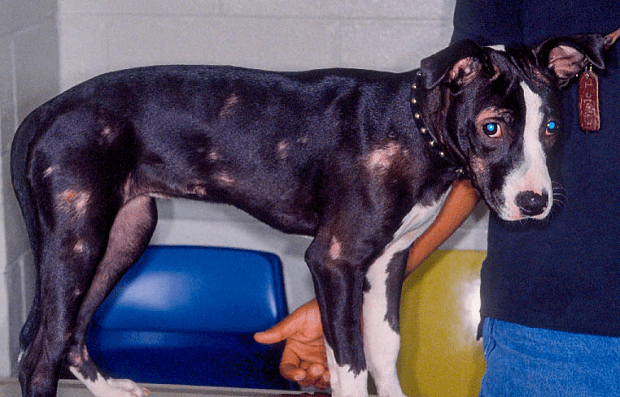Ringworm is a common fungal infection that affects many animals, including cats, dogs, and livestock. Despite its name, ringworm is not caused by a worm but by a fungus that thrives on the skin, hair, and nails of animals. If you suspect your pet has ringworm, it's important to understand how to treat it effectively. This guide will walk you through the symptoms, treatment options, and preventive measures for ringworm in animals.

Ringworm is a contagious fungal infection caused by several types of fungi, including Microsporum and Trichophyton. It appears as circular, red patches on the skin, often with a scaly or crusty appearance. The name "ringworm" comes from the ring-like pattern that the infection can create on the skin.
Common symptoms of ringworm in animals include:
Circular patches of hair loss
Red, scaly, or crusty skin
Itching or discomfort
Inflammation or swelling in the affected areas
If you notice any of these symptoms in your pet, it's important to consult a veterinarian for a proper diagnosis.
Before starting any treatment, it’s crucial to get a proper diagnosis from a veterinarian. They may perform a physical examination, take skin scrapings, or use a special lamp (Wood's lamp) to identify the fungal infection.
Your veterinarian may prescribe antifungal medications, which can be topical (applied directly to the skin) or systemic (taken orally). Common antifungal treatments include:
Topical treatments: Creams, ointments, or shampoos that contain antifungal ingredients such as miconazole or clotrimazole.
Oral medications: Systemic antifungals like griseofulvin or terbinafine, which may be necessary for more severe infections.
Regular bathing with medicated shampoos can help remove fungal spores from the skin and fur. Follow your veterinarian's recommendations on how often to bathe your pet. Additionally, grooming your pet can help remove dead hair and skin, reducing the spread of infection.
Ringworm spores can survive in the environment, so it’s essential to clean your home thoroughly. Here are some steps to take:
Wash bedding, toys, and any fabric items your pet uses in hot water.
Disinfect surfaces with a solution of bleach and water (1:10 ratio) to kill spores.
Vacuum carpets and furniture frequently, and dispose of the vacuum bag immediately.
To prevent the spread of ringworm to other pets or humans, isolate the infected animal until they are fully treated and no longer showing symptoms. Keep them in a separate room and limit their interaction with other pets.
Ringworm, a common fungal infection affecting both humans and animals, is often treated with antifungal medications. However, many people seek natural alternatives, including herbal remedies. This article will explore various plant-based options that may help treat ringworm.
Ringworm is caused by fungi that thrive on the skin, hair, and nails. It appears as red, circular patches and can be itchy and uncomfortable. While conventional treatments are effective, some individuals prefer using herbal remedies to avoid side effects or chemical treatments.
Properties: Known for its antifungal and antiseptic properties, tea tree oil is a popular choice for treating ringworm.
Application: Dilute a few drops in a carrier oil and apply it directly to the affected area twice daily.
Properties: Garlic has antifungal properties due to a compound called allicin.
Application: Crush fresh garlic cloves and mix with olive oil. Apply the mixture to the affected area and cover it with a bandage for a few hours.
Properties: Coconut oil contains medium-chain fatty acids that have antifungal effects.
Application: Apply a thin layer of coconut oil directly to the affected skin two to three times a day.
Properties: Aloe vera has soothing and antifungal properties, making it helpful for skin infections.
Application: Apply fresh aloe vera gel to the affected area multiple times daily.
Properties: Oregano oil is known for its strong antifungal properties due to compounds like carvacrol.
Application: Dilute oregano oil with a carrier oil and apply it to the affected area once or twice a day.
While herbal remedies can be effective, it’s essential to take precautions:
Consult a Healthcare Professional: Always talk to a doctor or veterinarian before trying new treatments, especially for severe cases.
Patch Test: Perform a patch test to check for allergies or skin reactions before applying any herbal remedy widely.
Combine with Conventional Treatments: Herbal remedies can be used alongside traditional treatments for enhanced effectiveness.
There are several herbal remedies that may help treat ringworm, including tea tree oil, garlic, coconut oil, aloe vera, and oregano oil. While these natural alternatives can be beneficial, it’s crucial to consult with a healthcare professional for proper diagnosis and treatment. Combining herbal remedies with conventional medicine may provide the best results, ensuring effective relief from this common fungal infection.
Preventing ringworm in animals is key to avoiding future infections. Here are some tips:
Regular grooming: Keep your pet well-groomed to help identify any skin issues early.
Healthy environment: Maintain a clean living space for your pets to reduce the risk of fungal infections.
Avoid contact with infected animals: If you know of an animal with ringworm, keep your pets away until the infection is treated.
Treating animals with ringworm involves a combination of veterinary care, proper medication, and environmental cleaning. Early detection and treatment are essential to ensure your pet recovers quickly and to prevent the spread of the infection. If you suspect your pet has ringworm, consult your veterinarian for the best course of action. With the right treatment and preventive measures, you can help keep your pets healthy and free from ringworm.
animal tags: animals
We created this article in conjunction with AI technology, then made sure it was fact-checked and edited by a Animals Top editor.